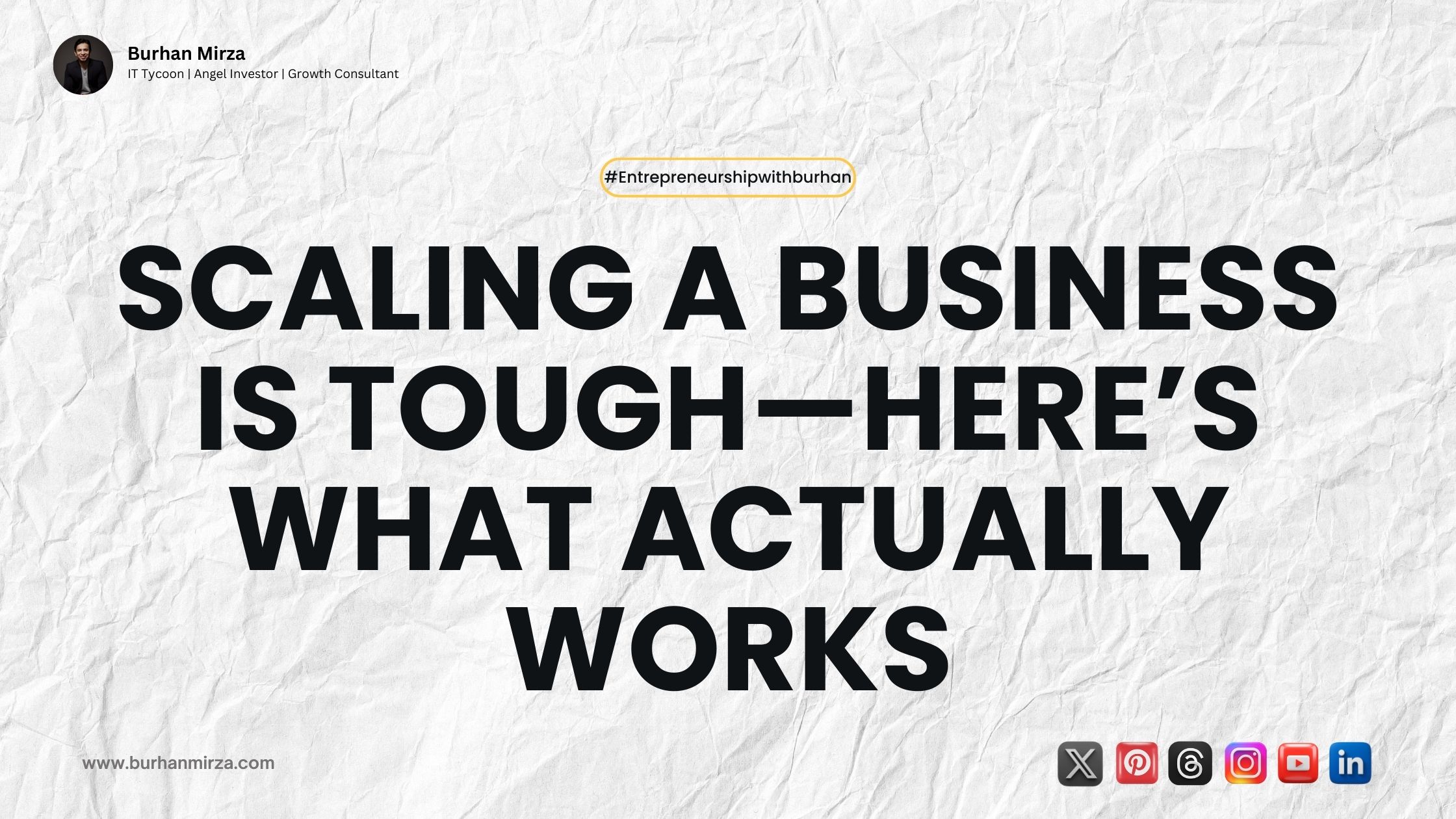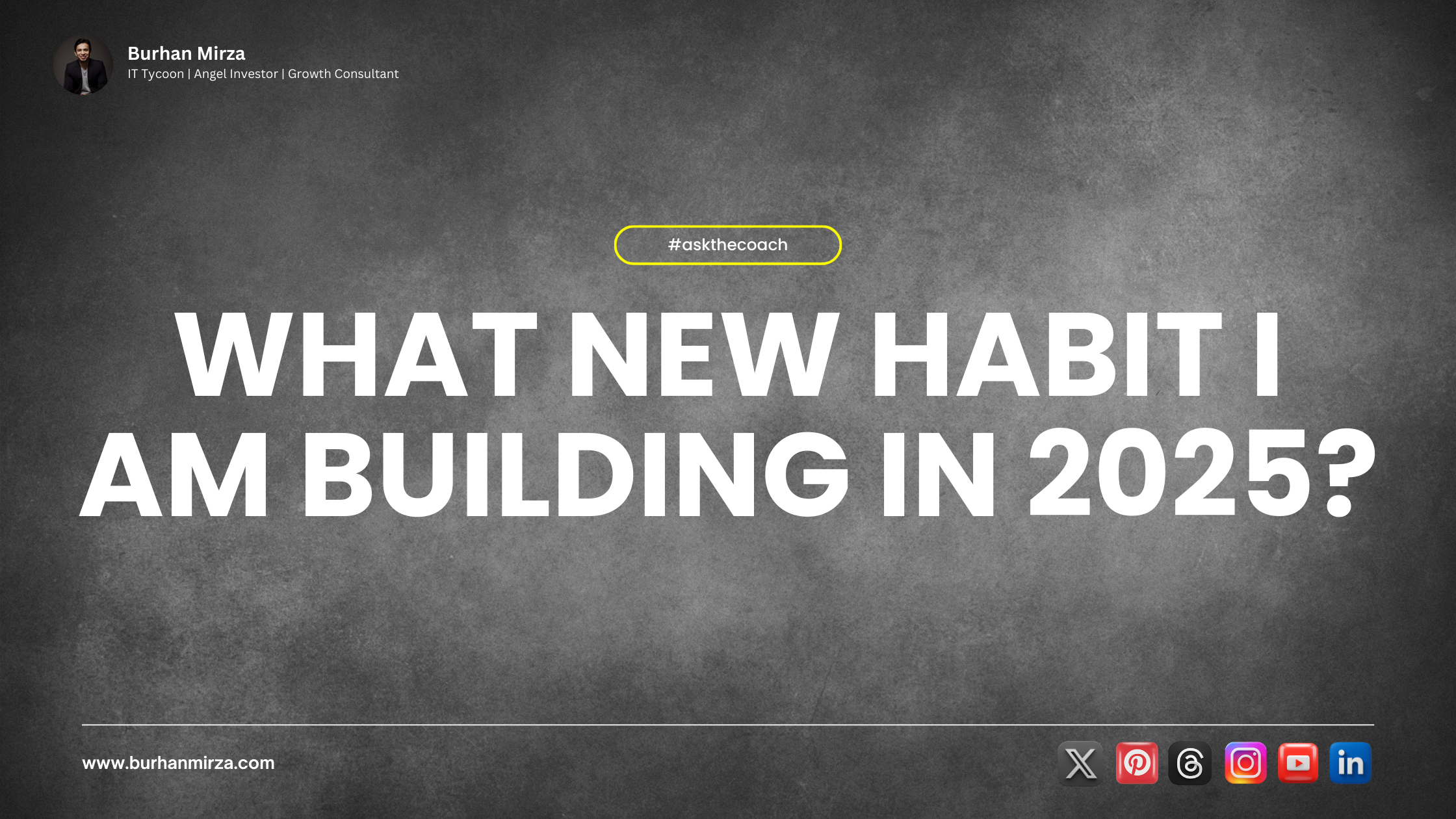 Blogs
Blogs
Scaling a Business Is Tough—Here’s What Actually Works

Everyone loves the idea of scaling. CEOs often get excited quite early on, when revenue starts coming in, and when the graph begins to climb. That’s when the conversations start: “Let’s scale this.” But here’s the part they don’t talk about enough, scaling a business is way harder than starting one.
See, starting is creative chaos. You’re inexperienced. You move fast. You can make changes instantly. It’s a playground for passion and energy. But scaling? That’s pure business-science. It’s a whole process. And if you don’t treat it like one, you’ll burn through cash, people, and mental health faster than you think.
The Muhammad Burhan Mirza you know today has spent years scaling multiple ventures and mentoring entrepreneurs. With all that experience I can tell you that scaling doesn’t happen when you work harder. It happens when you work smarter. Let me explain it in more detail.
1. Product-Market Fit Comes First, Not Funding
As a CEO, you shouldn’t be thinking about scaling until you have a strong product market. And I don’t mean just a few customers and good feedback. I mean retention, referrals, and repeat purchases.
If people aren’t sticking around or telling others about your business, you don’t have a scalable product; it’s just a temporary hype. So, if you want to begin scaling, always wait till you have a strong product market fit.
2. Systems Are More Attractive Than Hustle
Scaling doesn’t require more hours. It requires better systems. If you try to do everything on your own, your business can’t grow after a certain while. This is why I always stress about the following in my blogs:
- Automate your backend processes.
- Build SOPs for repeatable tasks.
- Create a training system that doesn’t need you in the room.
- Implement dashboards and KPIs to track performance in real time.
3. Hire for the Next Stage, Not the Current One
Most leaders hire based on what they need today. That's a big mistake. You need to hire for the company you’re striving for, not the one you are right now. That means bringing in talent who has already been where you want to go.
Look for people who have seen scaling, managed teams, handled crisis, and built structures. Yes, they’ll be more expensive. But under-hiring will cost you more in terms of missed growth and operational drag.
4. Know Your Unit Economics to the Decimal
At scale, even a 5% margin error can tank your whole business. You must know your CAC (Customer Acquisition Cost), LTV (Lifetime Value), churn rate, and contribution margin like the back of your hand.
Guessing these numbers is just gambling. And scale doesn’t forgive guesses. The most successful leaders I know are obsessed with these metrics. That's because scale magnifies everything: the good and the bad.
5. Keep It Boring, Not Trendy
Trendy businesses are fun but scalable businesses are predictable. Focus on what works instead of reinventing your offer, brand voice, or product suite just because you’re bored. Scaling is about doing the same winning thing 1,000 times over, not switching it up every week.
If you're doing email marketing, perfect it. If you're running ads, double down and optimize. If referrals are working, build a system around it. Repetition is the real growth hack.
6. Don’t Scale Chaos
Whatever you don’t fix in the startup phase will haunt you at scale. Poor customer
support? Multiply that by 10x clients. Weak backend system? Now it crashes weekly. Bad
team communication? Now there’s mismanagement everywhere.
Scaling magnifies your weaknesses along with the profit. So before you grow, clean
your house. Build solid foundations or you’ll just end up scaling dysfunction.
7. Culture Matters More Than You Think
When you have 5 people, you can wing your culture but At 50? It becomes your operating system. Always set values, document them, and hire, fire, and promote based on them. Culture protects scale. It tells people how to behave when you’re not in the room. And when everyone knows the rules of the game, things run smoother.
8. Scaling Isn’t Just Up. It’s Out, Too.
Not every business should grow vertically. Sometimes scale means going wide by diversifying products, targeting new markets, and improving customer lifetime value.
Vertical growth burns fast while horizontal growth builds resilience. Think beyond “more sales.” Think about deeper impact, smarter systems, and long-term sustainability.
Final Thoughts
Scaling a business isn’t easy. It comes with a lot of hard work, trying out new strategies, compromising on profit and sleepless nights. But when you do it right, it’s also the most rewarding part of the journey.
Don’t chase scale for the likes. Scale because your product works, your people are ready, and your systems are dialed in. Then build slow, steady, and strong. Because that’s what actually works.
 Muhammad Burhan Mirza
Muhammad Burhan Mirza My Story
My Story Events
Events Social Highlights
Social Highlights Books
Books Blog
Blog Press Kit
Press Kit  Contributions
Contributions 

